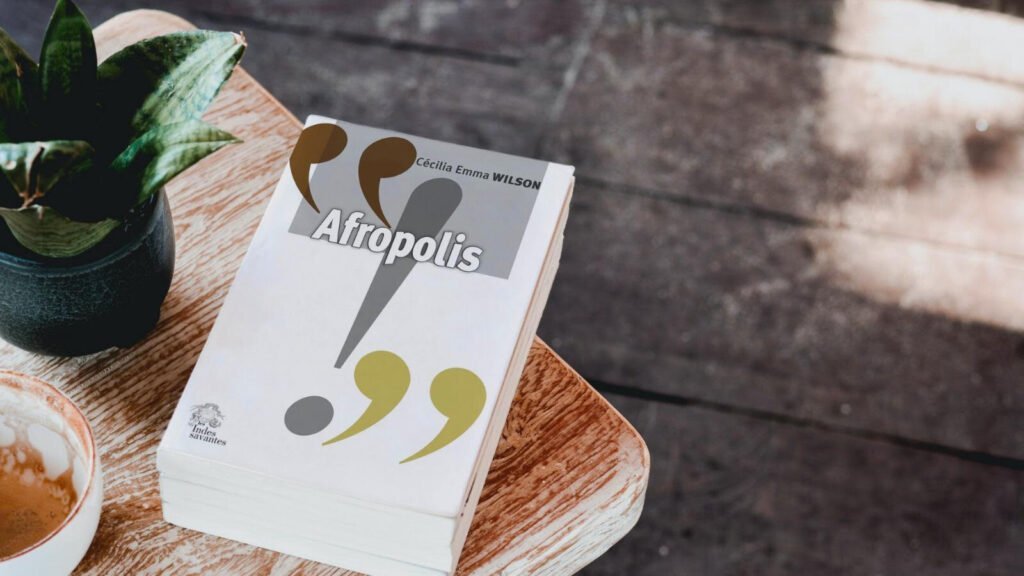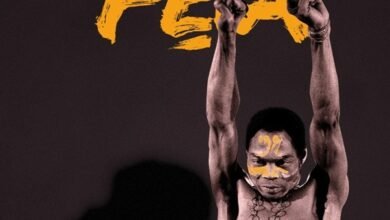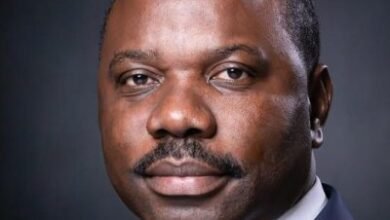Books/Culture Cecilia Emma Wilson: “The cultural dimension of Pan-Africanism is increasingly taking the form of soft power”.
In her essay Afropolis*, or the City of Afro-Populations, Cécilia Emma Wilson attempts to define modern Pan-Africanism. She argues that African diasporas around the world are at the forefront of this movement, particularly in the development of pop culture. Interview.

Interview by Mérième Alaoui
Cécilia, how did your pan-Africanism come about?
I’m a writer and I define myself as an African because I was born in Togo and grew up between Lomé, Accra and Cotonou, but also as a diasporic African because of my Brazilian origins and my presence in France for over ten years. So, my African identity is twofold, both rooted and uprooted. My writing is political and trans-African. Whether in poetry, fiction or essays, I systematically position myself within an intra- and extra-continental Africa.
A multiple identity that is expressed in this book « Afropolis »
The idea was born six and a half years ago, when I was still a doctoral student at Sciences Po in Paris. At the time, the cultural world, especially the film and music scene in the United States, was buzzing with references to sub-Saharan African cultures. I was also the founder of a pan-African student association. For me, it was about getting involved in something that was in my own DNA, because I’m originally from four West African countries (Togo, Benin, Ghana and Nigeria) and I also have Afro-Brazilian roots. I’ve been immersed in an environment that has always been a link between Africa and its ancient diasporas.
You also looked at the success of the Black Panther ‘phenomenon’. How do you interpret this? As a ‘rehabilitation’ of the image of Africa through cinema…
The reference to Black Panther came a little later, when I found a publisher. It’s a film that speaks to everyone, not only because it’s part of pop culture, but also because it has a lot of historical references. The question of Africa and the diaspora has always been there, so much so that Haiti had already tried to join the African Union and Malcolm X at the time approached the organization to ask for help and support for black Americans facing segregation.
However, the pan-Africanism of the founding fathers is not the pan-Africanism of today. It has evolved over time and with changing circumstances. Is there any kind of revival today?
There is no single Pan-Africanism. The ideology is quite fragmented. Today we are most familiar with the institutional idea of a continental union and the desire to free ourselves from all forms of external domination. But there are other branches of Pan-Africanism. Kemitism still exists, although I find it very difficult to share its clear-cut positions. Ethiopianism still exists and can be found in the songs of artists such as the Jamaican Damian Marley or the Afro-American rapper Nas. Afro-American Islam also exists and is very present in Chicago.
It was the continued oppression of people from Africa that gave rise to the idea of union. The black diasporas were the pioneers and it was they who organized themselves to create the first institutions. Slavery, segregation and structural racism led them to look to the continent of their ancestors. In Brazil, the Malês, mostly Muslim slaves, revolted before being sent back to the West African coasts, particularly Benin, Togo and Nigeria, where they became part of the most privileged social classes. The first president of Togo is a descendant of these people. The term « Pan-Africanism » was first used by the Trinidadian lawyer Henry Sylvester-Williams and later by the Afro-American W.E.B. du Bois, Kwame N’Krumah’s mentor. That’s how N’Krumah returned to Ghana with the idea of a continental union that would include what the African Union defines as its sixth region, the diaspora.
Finally, what is the definition of modern Pan-Africanism? Some people compare it to the term « West » to refer to all the countries of the North?
Pan-Africanism is a social, economic, cultural and political vision for the emancipation of Africans and Afro-descendants on the continent.
Pan-Africanism is in no way comparable to Western and European ideologies. The concept of the West emerged with the Roman Empire from 245 onwards. The term means ‘setting sun’ in Latin and was used to justify the domination of other peoples. Because of its history, it has very strong political and ideological connotations.

Pan-Africanism, on the other hand, emerges as a response to survival and protection against all attempts at domination. It is not oriented towards the idea of conquering others, but towards the idea of conquering oneself, that is knowing oneself and achieving reparation and complete restoration at all levels. Finally, the historian Cheikh Anta Diop argued in terms of cultural epochs, in other words, there are regional blocks that correspond to precolonial logics and within which common roots can be found. His analysis is quite effective, since the continent has seen the creation of regional organizations based on common cultural eras.
What is the role of the African diaspora in this ‘new’ Pan-Africanism?
Pan-Africanism cannot be imagined without its diasporas. The very idea of Pan-Africanism originated in the ancient Caribbean and American diasporas. It was imported to the African continent under their influence. We forget that the diaspora was at the origin of the construction of several African states, whether we are talking about the Krio of Freetown in Sierra Leone, the Americo-Liberians of Liberia or the Afro-Brazilians of southern Benin, Togo and Nigeria. They are the descendants of Harriet Tubman, the Afro-American activist who led modern Liberia. They are also the descendants of the Afro-Brazilians who contributed to the fight for Togo’s independence and were unwavering supporters of the kingdom of Abomey. The success of the Year of Return to Ghana in 2019, with the presence of celebrities from the Caribbean and the United States, shows that this link between the diaspora and Africa is strong and constitutes an economic manna for African countries. Beyond these influences, it should be remembered that Yoruba is still one of the languages spoken and studied in Cuba and Brazil. There are still Afro-Cubans in Cuba who speak Kikongo. Culturally, we have a lot in common. The rap that emerged in the tough neighborhoods of New York in the 1970s came from the culture of African griots. This influence is necessary to strengthen the cultural industries and promote economic development through identity. President Talon has been following this path for several years in his country, Benin, as evidenced by the many cultural infrastructure projects, the opening of new museums, the development of tourism for the diaspora and the promotion of a shared history.
What are the avenues of cultural Pan-Africanism today? In France, for example, we see the integration of common words and expressions in pop culture, social networks, rap music, etc.
Pan-Africanism in its cultural dimension is increasingly taking the form of « soft power », a gentle power that is slowly but surely spreading everywhere. There’s the Ivorian Nouchi language and expressions. I could mention its Anglophone counterpart, Nigerian pidgin. Some Ivorian Nouchi words like « brouteur » and « go » have found their way into the French dictionary. The French rap scene has been heavily influenced by the two Congos for about ten years now. Whether we like it or not, the African continent is becoming an integral part of external identities in the fields of gastronomy, music, fashion and cinema. The boom in Nollywood cinema is a case in point. The continued presence of fashion designers who are now joining prestigious institutions, such as the Franco-Cameroonian Imane Ayissi, the first fashion designer from sub-Saharan Africa to be recognized by the Chambre Syndicale de la Haute Couture. These are not just influences, but industries built around the plural identities of Africa, opening up a market where supply and demand meet on a global scale. This is a great asset for economic prosperity and job creation.
How do you see the future of Pan-Africanism? Will it become stronger? Or will it lose influence? At the beginning of the book you mention the phenomenon of African-Americans « returning » to Africa…
If Bob Marley’s widow settled in Ghana, why not others? Nothing is predetermined. In fact, I’d say that anyone interested in the continent can take a look. I doubt that all the old diasporas will decide to settle on the continent because they have built their lives elsewhere. But as far as contemporary diasporas are concerned, there is the phenomenon of « repats », people who have studied in the West and decide to return depending on the opportunities on the ground. There is a large contingent in Abidjan. And they’re not necessarily Ivorians; they often come from other African countries. Youssoupha, the Franco-Congolese rapper, has settled there, to give you an example. I doubt that teleworking will become widespread and allow people to go and live elsewhere! There are already diasporas coming and going, often retired, living between their country of origin and their country of adoption.
As for continental institutional pan-Africanism, it has shown its limitations. The proof is in the impossibility of adopting the common eco-currency in the ECOWAS zone. Politics has its own interests. Nevertheless, a country that sets an example or shows the way may encourage others to follow. Following the Year of Return organized in Ghana, Benin is now embarking on the path of heritage tourism. It’s by looking at these examples that other countries will take the plunge if it seems economically viable.
*Cécilia Emma Wilson, Afropolis, Ed Les Indes Savantes, 124 pages, 18 euros






